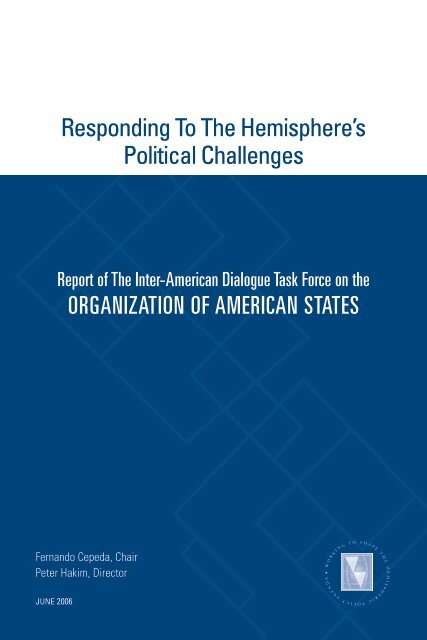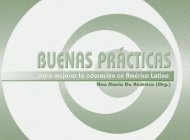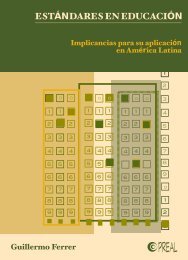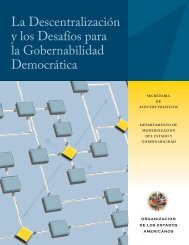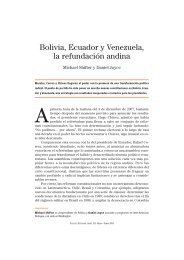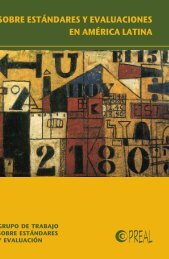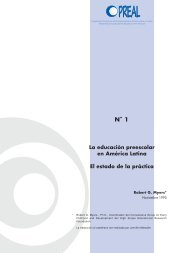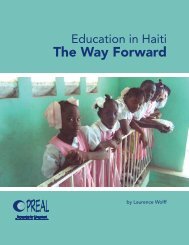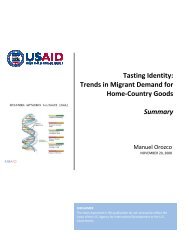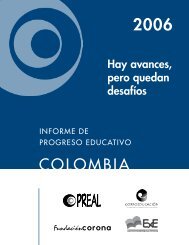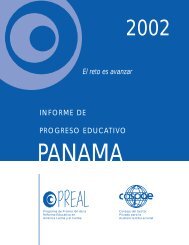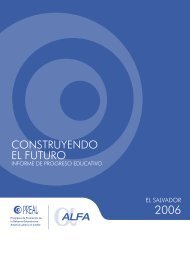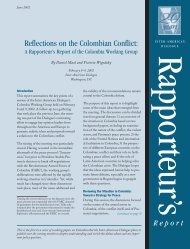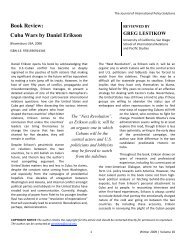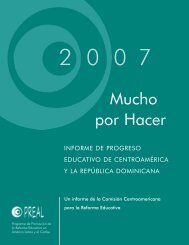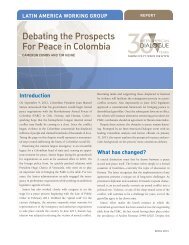View PDF Document - Inter-American Dialogue
View PDF Document - Inter-American Dialogue
View PDF Document - Inter-American Dialogue
You also want an ePaper? Increase the reach of your titles
YUMPU automatically turns print PDFs into web optimized ePapers that Google loves.
Responding To The Hemisphere’s<br />
Political Challenges<br />
Report of The <strong>Inter</strong>-<strong>American</strong> <strong>Dialogue</strong> Task Force on the<br />
Organization of <strong>American</strong> States<br />
Fernando Cepeda, Chair<br />
Peter Hakim, Director<br />
June 2006
<strong>Inter</strong>-<strong>American</strong> <strong>Dialogue</strong><br />
Board Of Directors<br />
Ricardo Lagos, Co-Chair, Chile<br />
Carla A. Hills, Co-Chair, United States<br />
Peter D. Bell, Vice Chair, United States<br />
Fernando Henrique Cardoso, Brazil<br />
José María Dagnino Pastore, Argentina<br />
David de Ferranti, United States<br />
Lourdes Flores Nano, Peru<br />
William L. Friend, United States<br />
Donna J. Hrinak, United States<br />
Enrique Iglesias, Uruguay<br />
Yolanda Kakabadse, Ecuador<br />
Barbara J. McDougall, Canada<br />
Thomas F. McLarty III, United States<br />
Peter McPherson, United States<br />
Roberto H. Murray Meza, El Salvador<br />
Sonia Picado, Costa Rica<br />
Jacqueline Pitanguy, Brazil<br />
Jorge Quiroga, Bolivia<br />
Jesús Silva-Herzog, Mexico<br />
Roberto Teixeira da Costa, Brazil<br />
Elena Viyella de Paliza, Dominican Republic<br />
Peter Hakim, President
Responding To The Hemisphere’s<br />
Political Challenges<br />
Report of The <strong>Inter</strong>-<strong>American</strong> <strong>Dialogue</strong> Task Force on the<br />
Organization of <strong>American</strong> States<br />
June 2006
Foreword<br />
More than ever before the nations of the Western<br />
Hemisphere need an active and effective regional<br />
organization to address a range of problems in the<br />
Americas, including those affecting domestic governance and<br />
security as well as those with international dimensions. Yet<br />
few governments assign priority to making the Organization of<br />
<strong>American</strong> States (OAS) such an organization. This was a central<br />
conclusion of an <strong>Inter</strong>-<strong>American</strong> <strong>Dialogue</strong> Task Force convened in<br />
2005 to review the work of the OAS and set forth recommendations<br />
for how the organization can and should be used to engage the<br />
varied challenges confronting the hemisphere.<br />
The task force included some 20 prominent leaders—<br />
former government officials, political figures, business leaders,<br />
academics and NGO representatives—drawn from the United<br />
States, Canada, Latin America, and the Caribbean. This report<br />
reflects the views of its members. Not every participant agrees<br />
fully with every point in the text, but each of them has endorsed<br />
the report’s overall content and tone, and supports its principal<br />
recommendations. In reaching its conclusions, the group<br />
followed three broad guidelines.<br />
• First, we decided that the report and recommendations would<br />
give most attention to what the OAS should be doing to address<br />
the hemisphere’s problems, rather than focusing our effort on<br />
issues of institutional reform, although these would not be<br />
entirely neglected. Most task force members agreed, moreover,<br />
that it was not mainly the organization of the OAS or its<br />
mandates that hampered its effectiveness. It was instead the lack<br />
INTER-AMERICAN DIALOGUE
of consensus among member states on the key issues and what<br />
needs to done about them.<br />
• Second, we decided the report should mainly address the<br />
hemisphere’s political agenda—safeguarding and advancing<br />
democratic governance, defending human rights, strengthening<br />
security, resolving conflicts, and managing the Summit of the<br />
Americas process. We do not underestimate the importance of<br />
other areas of OAS work, but we judge that the OAS is most<br />
importantly a political organization. It is the only hemispheric<br />
organization with authority to deal with political issues and<br />
arrangements, and we consider that to be its most vital role.<br />
• Third, our objective has been to make this exercise and the<br />
resulting report as useful as possible to the leadership of the OAS—<br />
the secretary general, other senior officials, and members of the<br />
Permanent Council—as well as to the region’s governments.<br />
All of us owe a debt of gratitude to Fernando Cepeda for his<br />
skill in chairing the task force and for his many contributions<br />
to this report. Jaclyn Shull, a program assistant at the <strong>Dialogue</strong>,<br />
deserves our appreciation for her assistance in bringing the task<br />
force together and preparing the report. We are especially grateful<br />
to the Canadian <strong>Inter</strong>national Development Agency (CIDA) and<br />
the Whitehead Foundation for their generous financial support<br />
of this initiative.<br />
Peter Hakim<br />
President<br />
June 2006<br />
<br />
RESPONDING TO THE HEMISPHERE’S POLITICAL CHALLENGES
Introduction<br />
The Western Hemisphere today is confronting a period of<br />
exceptional challenges. Political and social tensions are severe and<br />
worsening in many countries of Latin America and the Caribbean.<br />
Relations between the United States and many nations of the region<br />
have become fractious, and a growing divisiveness has developed<br />
among Latin <strong>American</strong> governments—often about the kind of links<br />
that the region should have with the United States. The Mar del<br />
Plata Summit revealed that common ground can be hard to find.<br />
U.S. relations with Latin America have never been easy.<br />
The enormous difference between the wealth and power<br />
of the United States and the countries of Latin America has<br />
fundamentally shaped hemispheric attitudes and institutions.<br />
Latin <strong>American</strong> nations have long been distrustful of the United<br />
States, and cautious about their relationships with Washington.<br />
Most of them recognize the vital importance of their political and<br />
commercial ties to the United States. At the same time, they have<br />
consistently sought to curb U.S. influence in their own countries<br />
and the region as a whole. For its part, Washington has often<br />
been disappointed by the lack of support from Latin America<br />
and the region’s rejection of U.S. leadership on many issues.<br />
The structure and operations of the Organization of <strong>American</strong><br />
States (OAS) reflect these fundamental tensions in inter-<strong>American</strong><br />
relations. The establishment of the OAS and its varied roles in<br />
hemispheric affairs are strong evidence of the interdependence<br />
of the United States and Latin <strong>American</strong> and Caribbean states and<br />
the fact that they share important common interests that can be<br />
advanced by cooperation. At the same time, as the OAS Charter<br />
and other key documents make plain, national sovereignty<br />
The OAS reflects the<br />
fundamental tensions<br />
in inter-<strong>American</strong><br />
relations.<br />
INTER-AMERICAN DIALOGUE
Recent developments<br />
in the Americas have<br />
given the OAS an<br />
expansive agenda.<br />
and non-intervention are basic guiding principles of all OAS<br />
actions, leaving no doubt that Latin <strong>American</strong> and Caribbean<br />
governments want clear restraints on the organization and its<br />
most powerful member. The U.S. government views the OAS as<br />
a mechanism for building alliances with Latin <strong>American</strong> nations,<br />
gaining their support on critical issues, and exerting leadership<br />
in hemispheric affairs. Latin <strong>American</strong>s see the organization, in<br />
part, as a means to moderate and contain Washington’s power<br />
and influence in the region.<br />
While recent developments in the Americas have given<br />
the OAS an expansive agenda of critical issues to address, the<br />
disagreements and strained relations among the hemisphere’s<br />
governments make it more difficult for the organization, which<br />
generally reaches decisions by consensus, to agree on appropriate<br />
courses of action and conduct its work.<br />
The Unique Role of the OAS<br />
Every member of the task force called for a more active and<br />
engaged OAS, and agreed that no significant governance issue<br />
should be excluded from the organization’s agenda. On this question<br />
there was no difference of opinion or hesitation. We reached quick<br />
consensus that no other regional or international organization can<br />
substitute for the OAS—although cooperation can and should be<br />
strengthened between the OAS and many other institutions. The<br />
UN has a significant role in hemispheric affairs, particularly where<br />
peacekeeping is needed, and the multilateral banks are important<br />
for the region’s economic development and social progress. The<br />
OAS, however, is the core institution for addressing regional<br />
issues, especially those concerned with political matters. No other<br />
organization has the necessary credibility and mandate to bring<br />
together the collective influence of the hemisphere’s countries to<br />
resolve disputes among member states, encourage compromise<br />
among governments on salient regional issues, credibly monitor<br />
national government performance on sensitive concerns, and press<br />
countries to change course when they violate hemispheric norms.<br />
In some instances, a smaller group or coalition of countries can<br />
<br />
RESPONDING TO THE HEMISPHERE’S POLITICAL CHALLENGES
join together to usefully address a regional issue or help a troubled<br />
neighbor confront domestic governance and security challenges.<br />
Such coalitions can make a significant contribution when OAS<br />
action is blocked by the opposition of some member governments,<br />
and their efforts can sometimes prompt subsequent OAS initiative.<br />
No group or coalition, however, can act with the unique legitimacy<br />
and broad mandate of the OAS.<br />
Leadership at the OAS<br />
Another fundamental point of agreement among task force<br />
members was that the effectiveness of the OAS critically depends<br />
on the consistent, vigorous, and sometimes risk-taking leadership<br />
of the secretary general. The OAS Charter conveys only limited<br />
executive power to the secretary general. Most formal authority<br />
resides in the Permanent Council where each of the 35 member<br />
states is represented by an ambassador with a single vote. At best,<br />
this arrangement results in extremely slow decision making; at<br />
times, when there are major differences among the states, it can<br />
lead to virtual paralysis. It is the secretary general—like the CEOs<br />
of most international institutions—who must drive the OAS.<br />
The secretary general clearly needs to have strong and<br />
constructive relations with the members of the Permanent<br />
Council. But he has to exercise leadership in the organization<br />
as well. The secretary general should make clear his priorities<br />
for OAS initiatives, offer a broad strategy for pursuing those<br />
priorities, propose courses of action in specific circumstances,<br />
and use his political skills and powers of persuasion to mobilize<br />
the backing of national governments for his agenda.<br />
When the Permanent Council cannot reach a decision on how<br />
to proceed, the secretary general still retains some capacity to<br />
act. If, for example, the council cannot agree to a fact-finding or<br />
mediating mission in a politically troubled country, the secretary<br />
general might himself assemble a team to gather needed<br />
information and assess the situation. Like most institutions,<br />
the OAS has a degree of bureaucratic flexibility that allows it to<br />
operate in the face of disagreements.<br />
It is the secretary<br />
general who must<br />
drive the OAS.<br />
INTER-AMERICAN DIALOGUE
Anticipating Crises<br />
The OAS needs<br />
continuing support<br />
from the countries<br />
of the hemisphere<br />
to carry out its<br />
mandate.<br />
That the OAS should play an anticipatory or preventive role<br />
in circumstances of prospective danger or crisis was an idea<br />
strongly endorsed by every member of the task force. Rather<br />
than merely responding to events and working to catch up,<br />
the OAS, it was agreed, should take the initiative to carefully<br />
assess, offer advice and assistance, and where possible, work to<br />
prevent serious violations of democratic norms, breakdowns in<br />
governance, internal violence, and disputes between nations.<br />
The secretary general and the OAS secretariat will have to take<br />
the initiative both to identify situations that demand attention<br />
and develop strategies for addressing them. They will also need<br />
to gain the support of OAS member states, including that of the<br />
government (or governments) concerned. To make anticipatory<br />
or preventive diplomacy work, the OAS will require specialized<br />
and expanded staff capacity and additional resources.<br />
The OAS Budget Squeeze<br />
Regardless of the quality of leadership provided by the secretary<br />
general, the OAS needs continuing support from the countries<br />
of the hemisphere to carry out its mandate—including political<br />
support, resources and staffing. Even the most talented leader<br />
cannot succeed without that support. Although recent progress<br />
to address the OAS’s financial problems is encouraging, the<br />
organization’s recurring budgetary crisis is shameful. It is a source<br />
of demoralizing institutional weakness. It constrains the OAS’s<br />
ability to establish priorities and plan ahead, to recruit and retain<br />
top level staff, conduct high quality programs, and initiate urgently<br />
needed activities. Most OAS programs now rely on grant funding<br />
for specific initiatives from governments and other institutions.<br />
The setting of priorities now often depends on the preferences<br />
of these donors rather than on decisions by the secretary general<br />
and Permanent Council. Without a substantial rise in revenues<br />
from member governments, the OAS could become increasingly<br />
hobbled and unable to carry out even its most central mandates.<br />
<br />
RESPONDING TO THE HEMISPHERE’S POLITICAL CHALLENGES
The OAS’s financial shortfalls are, in significant part, a<br />
reflection of the limited support for the institution and its work<br />
among many countries of the hemisphere. For the past dozen<br />
years, the OAS budget has been squeezed by the resistance of<br />
many governments to increase their annual payments—even<br />
to compensate for rising costs, let alone for expanded activity.<br />
Member states agreed to a modest increase in February, but far<br />
more is required to put the OAS on a solid financial footing.<br />
Unless governments are prepared to pay more to strengthen<br />
the financial base of the OAS, the only realistic course will be to<br />
substantially downsize the organization and curtail its mandate<br />
and authority. Members of the task force believe it would be a<br />
serious mistake to pursue that alternative.<br />
We call on the nations of the hemisphere to bolster the OAS’s<br />
finances and provide it with the resources it needs to conduct<br />
its work. It is long past time that the member states agreed to<br />
permanently raise their annual payments to the OAS; these have<br />
been frozen for more than a decade, even as staffing and operational<br />
costs have soared. The organization’s budget is now the equivalent<br />
of one-half of what it was in 1994. Staff has been pared by nearly<br />
one-third, while there remains almost no funding for non-staff<br />
costs. Even worse, many countries are in substantial arrears in their<br />
quota payments, some because of disagreements with the policies<br />
of the organization. Task force members did not have a solution to<br />
the problem, but almost all of us felt that member governments<br />
should consider imposing penalties on non-paying countries.<br />
Additional financing, however, is not enough. The hemisphere’s<br />
governments need to demonstrate continuing support and respect<br />
for the organization by appointing the best qualified people they<br />
can to serve as permanent representatives to the OAS—and<br />
encourage the selection of top quality individuals from their<br />
countries for staff positions. That is not always the case today.<br />
The member states<br />
need to permanently<br />
raise their annual<br />
payments to<br />
the OAS.<br />
The <strong>Inter</strong>-<strong>American</strong> System<br />
Task force members agreed that there is much to be gained<br />
from closer and broader collaboration among the multiple<br />
INTER-AMERICAN DIALOGUE
A challenge to<br />
democracy in any<br />
country of the<br />
Americas is the<br />
concern of every<br />
country.<br />
institutions that make up the <strong>Inter</strong>-<strong>American</strong> System. The <strong>Inter</strong>-<br />
<strong>American</strong> Development Bank and the Summit of the Americas<br />
process are the two most important of these institutions, but they<br />
also include the UN Economic Commission for Latin America<br />
and the Caribbean (ECLAC) and other UN organizations, the<br />
Pan <strong>American</strong> Health Organization, and numerous subregional<br />
organizations such as the Andean Development Corporation<br />
(CAF), the Caribbean and Central <strong>American</strong> Development<br />
Banks, and many others. Historically, each of these organizations<br />
has, for the most part, operated independently of the others<br />
although they have worked closely together on some specific<br />
issues (trade and poverty reduction, for instance) and in a few<br />
countries (Haiti is an example). The task force did not advance<br />
specific proposals for achieving greater cooperation, but urged<br />
the institutions to be more aggressive and imaginative in seeking<br />
ways to more effectively join their varied skills, objectives, and<br />
resources to meet common goals. If it can rebound from the<br />
disappointing 2005 meeting in Mar del Plata, the Summit of the<br />
Americas might be the right forum for exploring such cooperation<br />
and identifying how it could be accomplished.<br />
Democratic Governance<br />
Defending and advancing democracy has been the OAS’s<br />
highest priority, at least since the approval of the Santiago<br />
Resolution in 1991, which called on the OAS to respond to<br />
interruptions of democratic rule in any of its member countries.<br />
Safeguarding democracy imposes three tasks on the OAS—to<br />
help strengthen democratic institutions and processes within<br />
countries; to monitor elections, particularly where there are<br />
threats of fraud or considerable distrust among political factions;<br />
and most important, and most controversial, to respond to<br />
threats to democratic or constitutional processes, including<br />
when the threat is entirely internal to a country.<br />
Taken together, these mandates, particularly the last one, add<br />
up to a hemisphere-wide acceptance of the idea that a challenge<br />
to democracy in any country of the Americas is the concern of<br />
every country. The adoption on September 11, 2001 of the <strong>Inter</strong>-<br />
<strong>American</strong> Democratic Charter makes clear the expectation—<br />
10<br />
RESPONDING TO THE HEMISPHERE’S POLITICAL CHALLENGES
indeed, obligation—that all member states will respond collectively<br />
to that challenge through the mechanism of the OAS.<br />
Bolstering Democratic Institutions<br />
Many institutions other than the OAS assist in the building and<br />
strengthening of democratic institutions. Multilateral banks and<br />
bilateral development agencies are investing in efforts to strengthen<br />
judicial systems, legislatures, and anti-corruption projects, and in<br />
many other democracy bolstering initiatives. Most of these agencies<br />
have one important advantage over the financially strapped OAS;<br />
they bring considerably more resources to the task, and are not as<br />
pressed to distribute their funds over many countries. The main<br />
asset of the OAS is that it embodies the collective political authority<br />
of the region’s governments to bear on the issues it addresses.<br />
The task force has not sought to evaluate OAS democracybuilding<br />
projects, but indications are that their quality and<br />
importance are very uneven, in some measure because multiple<br />
claimants and few resources mean the projects are small and<br />
scattered. An independent evaluation of these efforts is needed to<br />
determine whether this should remain a top priority of the OAS,<br />
how it could be done better, and whether structured cooperation<br />
with other institutions (with larger resources) would enhance the<br />
OAS’s democracy-building efforts. Surely, poor quality initiatives<br />
in this area are not helpful to the OAS in its broader work to<br />
advance democratic governance. Some members of the task force<br />
felt that democracy-building activities could be dropped without<br />
doing harm given the large number of other agencies that are<br />
involved in this work. Others strongly disagreed, arguing this was<br />
central to the OAS’s mandate. The question that the OAS staff and<br />
Permanent Council should address is whether other items on the<br />
OAS democracy agenda—electoral monitoring and preventing<br />
constitutional violations, for example—represent a higher priority<br />
use of the organization’s limited funds and staff expertise.<br />
OAS electoral<br />
monitoring is<br />
highly regarded.<br />
Monitoring Elections<br />
Election monitoring is one of the OAS’s highest priority<br />
activities, and it enjoys wide support. It is also pursued by many<br />
INTER-AMERICAN DIALOGUE<br />
11
HAITI. Despite the hopes generated by the recent electoral outcome, no one questions the need for<br />
a considerable measure of outside intervention in Haiti. On its own, Haiti cannot sustain a credible or<br />
minimally effective government. Public institutions are embryonic at best. It is the country where it has<br />
been easiest to justify a major continuing role for the international community, but it is probably the most<br />
difficult setting in which to find a lasting solution. The OAS is only one of the many international agencies<br />
involved.<br />
In the past two years, the OAS has had principal responsibility for preparing for elections, while crucial<br />
security assistance and economic aid are managed by others. Overall coordinating responsibility rests<br />
with the UN, along with the supervision of a Haiti peacekeeping mission. It is ironic that the mission is led<br />
by Brazil and mostly composed of Latin <strong>American</strong> troops—while Latin <strong>American</strong> nations are unwilling to<br />
consider involving the OAS in peacekeeping operations. The lack of a security or peacekeeping capacity<br />
may relegate the OAS to a secondary role in Haiti. But there is no question that the organization has a<br />
vital part to play in building and sustaining a democratic government in the country. The recent elections<br />
are only the first step toward that objective. Given the nation’s conflictive politics and the distrust among<br />
various political forces, the secretary general should be well prepared to take on a mediating role or<br />
engage in constructive problem solving when needed—as he did in resolving the electoral dispute over<br />
whether a second round of voting was required. Task force members agree that Haiti must be a first order<br />
priority for the OAS, and that an intense involvement there will need to persist for many years.<br />
NICARAGUA. OAS intervention in Nicaragua last year helped prevent the country’s legislature and<br />
judiciary, dominated by two corrupted parties, from ousting the president or making it virtually impossible<br />
for him to govern. The challenge for the OAS and others now is to do what is possible to ensure a free<br />
and fair presidential election next November, which is critical for Nicaragua to regain any real measure<br />
of democratic stability. This will require a sustained OAS engagement, given the almost certain efforts of<br />
the two major parties to rig the electoral rules and procedures using their control over key institutions in<br />
the country.<br />
BOLIVIA AND ECUADOR. Weak political institutions combined with deep ethnic and social divisions<br />
have made it extremely hard to govern either Bolivia or Ecuador. In both countries, elected presidents have<br />
been forced out of office by popular demonstrations and street protests—and the politics of both have<br />
become disorderly and confrontational. Hostility and distrust between different regions and ethnic groups<br />
threaten the unity of the two countries.<br />
No one disputed the fairness of Bolivia’s December 2005 presidential election (monitored by the OAS),<br />
which led to an overwhelming victory by indigenous leader Evo Morales, who now has unquestioned<br />
legitimacy to govern, more so than any Bolivian president in the past half century. Although Bolivia’s<br />
basic social and political tensions remain to be resolved, there is now some opportunity to repair the<br />
nation’s political divisions and establish the basis for democratic progress. The OAS and others should be<br />
encouraging the new president to reach out to his political opponents and find ways to work constructively<br />
with them. Neighboring countries, particularly Brazil and Argentina, which have major financial interests<br />
in Bolivia, can play an important role. It is also important for OAS officials—both directly and through<br />
Latin <strong>American</strong> and European governments—to do what is necessary to avoid any early clashes between<br />
Washington and the new government of Bolivia over anti-drug programs. A constructive relationship<br />
between Bolivia and the United States, which provides significant aid to the country, would contribute to<br />
the success of the Morales presidency.
Ecuador holds its next presidential election later this year, 2006. The most important task for the OAS<br />
is to help assure that the vote is conducted fairly—but credible elections are only part of the challenge<br />
facing Ecuador. The last three elected presidents have all been forced out of power in ways that were<br />
constitutionally questionable. This is a country in which anticipatory action, if it had been initiated by the<br />
OAS when the government disbanded the Supreme Court last year, might have made a difference; such<br />
action could be important in the coming period. The OAS cannot be content merely with a fair election in<br />
Ecuador. It also should be seeking ways to avert the kind of vicious battles that have come to characterize<br />
Ecuadorian politics and often end in constitutional crises. The outcome of the elections in the coming<br />
months could help to mitigate political antagonisms. It is important that an electoral mission be sent to<br />
the country soon to help prepare for next year’s election.<br />
VENEZUELA. Venezuela today represents a particularly difficult challenge for the <strong>Inter</strong>-<strong>American</strong><br />
Democratic Charter and its fundamental principle that the nations of the hemisphere are obligated to<br />
respond collectively to threats to democratic governance. The six-year-old government of Hugo Chávez<br />
dominates every one of the country’s public institutions. His governing power is virtually unconstrained.<br />
He controls every seat in the legislature (because the opposition declined to compete in the last election),<br />
the courts and electoral commission are packed with his supporters, and legal restrictions now put sharp<br />
limits on the activities of opposition groups, civil society, and the press. Some argue he is pushing an<br />
authoritarian agenda across Latin America with revenues from high-priced oil. Venezuela is playing an<br />
adversarial role within the OAS itself, making it harder for the organization to reach consensus and to<br />
operate in some areas.<br />
The OAS monitored recent elections in Venezuela; the intense criticism it received from both the<br />
government and the opposition illustrates how difficult it is for the organization to act in highly polarized<br />
situations where there is virtually no middle ground and little willingness to compromise. The OAS<br />
has plainly not been able to respond forcefully to the multiple restrictions that have been imposed<br />
on democratic politics in the country. OAS initiative has been restrained by an array of factors—the<br />
extent of President Chávez’s popular support, his long series of electoral victories, and the weakness of<br />
opposition groups within the country. Most OAS governments are reluctant to openly oppose Chávez, in<br />
some measure because their commercial relations with Venezuela are significant and Chávez is a popular<br />
figure in many countries. In addition, however, Latin <strong>American</strong> governments are uncomfortable with U.S.<br />
proposals to confront and isolate the Chávez government.<br />
There are no very good options for the OAS. To do nothing, to simply treat Venezuela as another<br />
democratic country, would underscore the shortcomings of the OAS and the limitations of its capacity<br />
to protect democracy. At the same time, OAS member states are unwilling to directly challenge the<br />
Venezuelan government. Even the secretary general is largely hamstrung by this situation. Although it is<br />
unlikely to have any immediate impact, what the secretary general can and should do is to make clear to<br />
President Chávez and other Venezuelan officials that their country is violating basic norms of democratic<br />
governance and to consistently urge a change in course. He should similarly criticize any undemocratic<br />
actions by opponents of the Chavez government. The secretary general should also be consulting<br />
regularly with the hemisphere’s presidents and other leaders about how to deal with Venezuela—and<br />
encouraging them, when appropriate, to express their concerns about democracy in that country. There is<br />
no easy formula for managing the situation of Venezuela. The political judgment of the secretary general<br />
will be critical in determining what kind of initiatives can be useful
Governments<br />
should not have the<br />
right to veto an OAS<br />
electoral mission.<br />
other agencies—the United Nations, the European Union, the<br />
U.S. and other governments, and many private organizations<br />
such as the Carter Center. Unlike democracy building, however,<br />
election monitoring is an area in which the OAS has developed<br />
exceptional expertise and enormous experience. Its electoral<br />
work is highly regarded.<br />
As it now stands, the OAS has the authority to monitor an<br />
election only when it is requested by the government of the<br />
country where the vote will take place. To be sure, political<br />
pressure from the OAS itself and from member countries directly<br />
is often enough to persuade a reluctant government to extend<br />
the necessary invitation to the OAS. Still, the great majority of<br />
task force members felt that, given the OAS’s mandate to protect<br />
democracy, governments should not have the right either to veto<br />
or delay the start of an OAS electoral mission. The OAS, in short,<br />
should be granted authority to monitor any and all Western<br />
Hemisphere elections that it determines need such monitoring.<br />
Some task force participants thought that this change would<br />
make it difficult for the OAS to decide not to monitor an election<br />
and could end up stretching the organization’s budget and<br />
staff. Most members argued, however, that OAS officials had<br />
responsibility for such decisions and could not avoid them.<br />
There are also strong arguments for the OAS to establish (and<br />
regularly replenish) a permanent fund for electoral monitoring—<br />
rather than depend on securing special funding for each mission.<br />
This would accomplish several important objectives. It would<br />
underline the importance assigned to electoral observation—and<br />
allow for a careful setting of OAS priorities regarding which elections<br />
to monitor and how intensely, and permit the advanced planning<br />
of each mission. It would also allow for election monitors to start<br />
their work well ahead of the election date (which is often vital to<br />
deter or uncover fraud and manipulation during the campaign).<br />
This now requires both the agreement of the monitored country’s<br />
government as well as the availability of resources.<br />
The task force also thought it important that the OAS, as a<br />
multilateral institution experienced in election monitoring,<br />
should have the lead role when other observer groups are<br />
14<br />
RESPONDING TO THE HEMISPHERE’S POLITICAL CHALLENGES
sponsored by national governments or non-governmental<br />
organizations. In those instances when the UN is involved, the<br />
OAS should share oversight responsibility. One crucial lesson<br />
from past OAS electoral missions is the critical importance<br />
of a strong and capable head of mission. That was vital to the<br />
successful outcomes of OAS monitoring in two of the most<br />
highly contested elections in recent memory, in Peru in 2000 and<br />
the Dominican Republic in 1994.<br />
Democracy in Danger<br />
The most challenging and controversial task of the OAS<br />
today is responding to threats to democratic governance<br />
and breakdowns of constitutional order—as required by the<br />
<strong>Inter</strong>-<strong>American</strong> Democratic Charter. There have been few<br />
circumstances when an OAS intervention to protect democracy<br />
has been easy or straightforward. The difficulties reflect the<br />
continuing disagreements among governments regarding, on<br />
one hand, the fundamental principles governing OAS action in<br />
such cases and, on the other, judgments about the significance<br />
of events within the country affected and what, in fact, can and<br />
should be done to restore the democratic process.<br />
There was broad agreement among the members of the task<br />
force that it is best to anticipate a crisis situation (or engage it<br />
as early as possible), and work to prevent a potential violation<br />
of the constitutional order, rather than having to react once<br />
a violation or breakdown occurs. Establishing a high quality<br />
monitoring facility within the OAS that would analyze and report<br />
on the condition of democratic governance in member states on<br />
a regular basis, particularly in those states where difficulties are<br />
apparent, would facilitate such anticipatory action.<br />
Even under the best of circumstances, however, it will be<br />
difficult to secure support from OAS member states for a major<br />
pre-crisis intervention—but it should be possible to gain<br />
consensus for more modest efforts, for example mediation<br />
between a government and opposition groups, as was<br />
accomplished in Peru in 2000. When there is little chance of<br />
It is best to work to<br />
prevent a violation<br />
of the constitutional<br />
order, rather<br />
than react once a<br />
breakdown occurs.<br />
INTER-AMERICAN DIALOGUE<br />
15
approval by the hemisphere’s governments for anticipatory<br />
or early action, the secretary general still has some room<br />
for initiative. Nicaragua and Ecuador are recent examples of<br />
situations in which the initiative of the secretary general and<br />
his staff helped to reduce tensions and possibly avert political<br />
confrontations. More generally, the leadership of the secretary<br />
general is central to the success of any OAS effort to prevent or<br />
reverse an interruption of democracy.<br />
To varying degrees and for different reasons, democratic<br />
institutions are troubled in many countries of Latin America.<br />
Challenges to democratic rule could emerge in nearly any nation<br />
of Latin America today. There are five countries, however, where<br />
democracy has been particularly unsettled and threatened<br />
during the past several years. In four of them—Haiti, Nicaragua,<br />
Bolivia, and Ecuador—weak governments generally have been<br />
unable to uphold the rule of law and even minimally address the<br />
problems confronting the nation. Venezuelan president Hugo<br />
Chávez has centralized power to the degree that there are no<br />
longer any checks on his authority. As discussed on pages 12 and<br />
13, all of these countries require sustained attention by the OAS<br />
and the broader international community.<br />
Human Rights<br />
Members of the task force strongly praised the work of the<br />
<strong>Inter</strong>-<strong>American</strong> Human Rights Commission and Court, which<br />
have long been considered the most effective and productive<br />
parts of the OAS. They were unanimous in endorsing the<br />
independence of the commission and court, making clear<br />
that the autonomy of these institutions was essential to their<br />
mission. Being part of the OAS enhances the legitimacy of the<br />
commission and court to make judgments about the behavior<br />
of national governments, but they would not be able to render<br />
authoritative and independent decisions if they were supervised<br />
by the OAS or its participating states. The task force also strongly<br />
urged hemispheric governments, when they nominate or elect<br />
members of the commission and court, to base their decision on<br />
16<br />
RESPONDING TO THE HEMISPHERE’S POLITICAL CHALLENGES
the quality and experience of the candidates, not their nationality<br />
or political perspectives.<br />
Task force members were divided on the issue of whether the<br />
commission and court, given the strong reputations they have<br />
gained over time, could effectively assume a greater political and<br />
policy role—and also maintain their standing as an independent,<br />
professional human rights institution.<br />
Many members supported the idea that the OAS Permanent<br />
Council and the secretary general do more to highlight the<br />
decisions of the human rights bodies and support their<br />
enforcement in the member states. Others, however, were<br />
concerned that the council and the secretary general would<br />
inevitably be selective, emphasizing some decisions and ignoring<br />
others—and accordingly, imposing something of a political filter<br />
on the findings of the commission and court.<br />
Another difficult issue for the task force was whether the<br />
commission should consider making its expertise available to other<br />
OAS programs. The advice of the commission could certainly be<br />
valuable to an OAS mission charged with assessing democratic<br />
practice in Haiti or Ecuador, for instance. The commission could also,<br />
for example, be helpful to the OAS program assisting Colombia’s<br />
efforts to demobilize the country’s paramilitary forces. Clearly,<br />
the commission could usefully advise the Colombian government<br />
and the OAS on what could be done to adjust the demobilization<br />
process to conform better to human rights norms while pursuing<br />
the goal of disarmament. The majority of task force members<br />
argued, however, that the commission should rarely, if ever, assume<br />
operational roles in OAS missions that are not plainly part of its<br />
human rights mandate. The human rights body should be especially<br />
careful to avoid politically controversial initiatives (such as assisting<br />
the demobilization process), which could end up compromising its<br />
independence and diminish its professional credibility.<br />
The autonomy of<br />
the human rights<br />
commission and<br />
court is essential to<br />
their mission.<br />
Security Matters<br />
Most task force members felt that, given the increased salience<br />
of security issues worldwide, the hemisphere’s governments<br />
INTER-AMERICAN DIALOGUE<br />
17
The hemisphere’s<br />
security instruments<br />
are outmoded.<br />
should encourage the OAS to take on a more active and<br />
significant role in this area. Several participants suggested that, in<br />
the aftermath of the 9/11 attacks, security would be an attractive<br />
area for U.S. cooperation with Latin America and the Caribbean<br />
(as it has already been in the case of Canada and Mexico). There<br />
are obstacles to be overcome, however.<br />
The hemisphere’s security instruments—the Rio Treaty and<br />
the <strong>Inter</strong>-<strong>American</strong> Defense Board—are outmoded. They need<br />
either to be thoroughly refashioned or eliminated. (Indeed,<br />
whether or not the OAS assigns new priority to security, these<br />
instruments should be overhauled.)<br />
Moreover, the U.S. security agenda is very different from<br />
that of Latin America and the Caribbean. For the United States,<br />
the central issue is international terrorism. Aside from Mexico<br />
and Canada, most countries of the hemisphere have little to<br />
contribute to the U.S. battle against terrorism. Moreover, the<br />
great majority of Latin <strong>American</strong> countries (including Mexico)<br />
are deeply critical of the U.S. international security strategy and<br />
how Washington is pursuing it. Finding the common ground<br />
needed for cooperation will not be easy.<br />
For Latin America and the Caribbean, the central security<br />
issue is crime and violence. Aside from economic failure and<br />
joblessness, this is the issue of greatest concern to the region’s<br />
citizens and governments. The OAS could, in principle, help<br />
foster intergovernmental cooperation to combat the international<br />
aspects of the region’s violent crime wave—including<br />
illicit drug and human trafficking, illegal weapons sales, and<br />
money laundering. The OAS has been successful in developing<br />
programs to monitor the anti-drug performance of the<br />
hemisphere’s countries (for the most part, replacing the widely<br />
unpopular U.S. certification process). It has not, however, been<br />
involved in direct efforts to battle the drug trade, nor is there<br />
an obvious role for it to play in that battle, given its reluctance<br />
to engage in military or police action. At best, it could serve as<br />
a forum in which the nations can discuss and seek to reconcile<br />
their different approaches.<br />
18<br />
RESPONDING TO THE HEMISPHERE’S POLITICAL CHALLENGES
The OAS has taken on major responsibility for assisting and<br />
monitoring the Colombian government’s efforts to demobilize<br />
the paramilitary forces—but this is an ad hoc initiative that will<br />
be difficult to translate into a broader “security strategy”. Task<br />
force members strongly endorse the OAS program in Colombia,<br />
and believe that it is what the OAS should be doing—taking on<br />
specific initiatives where it can play a useful part, rather than<br />
seeking to define a broad agenda in a complex and controversial<br />
area. The ability of the OAS to identify and define other<br />
appropriate security initiatives will depend on the secretary<br />
general’s leadership in pursuing this role and mobilizing the<br />
support of member governments.<br />
Dispute resolution is an area closely related to security. Most<br />
members of the task force felt that the OAS should take on a more<br />
significant role than it has to date in seeking to mediate and resolve<br />
at least some of the outstanding border and territorial disputes<br />
between its member countries. As in the case of other security<br />
issues, the task force agreed that the best way for the OAS to<br />
proceed is to focus on a small number of specific disputes, rather<br />
than trying to develop a comprehensive agenda. As suggested<br />
in the discussion on “anticipating crises”, it should largely be up<br />
to the secretary general to exercise initiative to identify which<br />
disputes to engage and to propose how to tackle them.<br />
It is largely up to the<br />
secretary general<br />
to identify which<br />
disputes to engage<br />
and to propose how<br />
to tackle them.<br />
Management of the Summit of the Americas Process<br />
Over the years, the OAS has taken on increasing responsibility<br />
for the now regularly scheduled Summits of the Americas. In<br />
many respects, it has served as the secretariat to the last two<br />
summit meetings. The OAS, including Permanent Council<br />
members and the secretary general and other staff, is involved<br />
in preparing for each summit, organizing wide consultations<br />
on the agenda and program of action; keeping track of summit<br />
initiatives and mandates; and monitoring post-summit activities<br />
undertaken by the governments.<br />
This role, however, is not a completely satisfactory one for the<br />
OAS. For one, the summit process has not lived up to its early<br />
INTER-AMERICAN DIALOGUE<br />
19
expectations and its role in hemispheric affairs has been limited.<br />
Indeed, there is some question whether the meetings should<br />
even be continued after the singularly unproductive summit<br />
recently held in Mar del Plata, Argentina. But even previous<br />
summits never succeeded in establishing a regional agenda.<br />
Summit declarations have not carried much influence.<br />
Moreover, the OAS has never been assigned real authority<br />
to guide the preparations—nor has it been provided the staff<br />
capacity or resources to do much to carry out the summit results.<br />
Some members of the task force felt that the summit may have<br />
become a diversion from the OAS’s higher priority tasks in<br />
democratic governance and other areas. Others thought that<br />
the OAS should have a stronger, more continuing participation<br />
in the summit, one that involved the secretary general and the<br />
Permanent Council in setting the agenda for each meeting and<br />
coordinating implementation of the summit decisions. This<br />
would, they argued, strengthen the summit process and give the<br />
OAS the central role in hemispheric affairs it should have. We all<br />
agreed that the current OAS involvement is unsatisfactory, but<br />
that it is premature to define a new role until there is a greater<br />
consensus on whether the summits should continue and, if so,<br />
what their mission should be.<br />
20<br />
RESPONDING TO THE HEMISPHERE’S POLITICAL CHALLENGES
Conclusions<br />
The task force was unanimous in urging support for a more<br />
active and robust OAS to engage the hemisphere’s political and<br />
governance challenges. The OAS could and should be playing<br />
a far more influential role in hemispheric affairs—but, in order<br />
to do so, it will need greater unity and cooperation among its<br />
member states. To be sure, there are organizational changes that<br />
would strengthen the OAS and it certainly needs a larger budget<br />
and more reliable financial support. But what most constrains<br />
the OAS are the divisions and antagonisms in inter-<strong>American</strong><br />
relations and the resulting disagreements among member states<br />
on the key issues and what needs to done about them.<br />
The multiple challenges affecting the nations of the<br />
hemisphere provide the OAS an ample agenda of work. At<br />
the same time, however, the strained relations among the<br />
hemisphere’s governments make it more difficult for the<br />
organization to act. The secretary general has considerable<br />
room for initiative on his own, and he should certainly take<br />
that initiative when the member states are unable to reach<br />
decision, and then do his best to get their support. Indeed, at<br />
all times, the effectiveness of the OAS critically depends on the<br />
imaginative and energetic leadership of the secretary general,<br />
and his ability to mobilize governments to take action. It is the<br />
secretary general who must drive the OAS. But, the OAS cannot<br />
be a strong and effective regional organization if its member<br />
states are unwilling to put aside their differences and use the<br />
organization to advance their common interests and values.<br />
What most<br />
constrains the OAS<br />
are the divisions<br />
and antagonisms<br />
in inter-<strong>American</strong><br />
relations.<br />
INTER-AMERICAN DIALOGUE<br />
21
Members of the Task Force<br />
Fernando Cepeda (Chair) is professor of political science at the University of the Andes. He was<br />
minister of government in Colombia.<br />
George Alleyne served as director of the Pan-<strong>American</strong> Health Organization (PAHO). He is chancellor<br />
of the University of the West Indies and special envoy of the UN secretary-general for HIV/AIDS in the<br />
Caribbean Region.<br />
Harriet C. Babbitt was deputy administrator of the U.S. Agency for <strong>Inter</strong>national Development (USAID),<br />
and served as U.S. permanent representative to the OAS. She is currently senior vice president of Hunt<br />
Alternatives Fund.<br />
Eduardo del Buey is executive director of the Canadian Foundation for the Americas (FOCAL). He<br />
served as director of external relations and public information at the OAS and advisor to secretary general<br />
César Gaviria on strategic communications.<br />
Jorge I. Domínguez is Clarence Dillon Professor of <strong>Inter</strong>national Relations and director of the<br />
Weatherhead Center for <strong>Inter</strong>national Affairs at Harvard University.<br />
Richard Fletcher was a senator for the People’s National Party in Jamaica, and a senior official of the<br />
<strong>Inter</strong>-<strong>American</strong> Development Bank.<br />
Diego García-Sayán is a judge on the <strong>Inter</strong>-<strong>American</strong> Court of Human Rights and the executive<br />
director of the Andean Commission of Jurists. He served as minister of justice of Peru from 2000 to 2001<br />
and as foreign minister from 2001 to 2002.<br />
Rosario Green was foreign minister of Mexico and is now general secretary for Mexico’s Institutional<br />
Revolutionary Party (PRI).<br />
Peter Hakim (Director) is president of the <strong>Inter</strong>-<strong>American</strong> <strong>Dialogue</strong>.<br />
Donna J. Hrinak was the U.S. ambassador to Brazil, Venezuela, Bolivia, and the Dominican Republic.<br />
She is currently director for corporate and government affairs for Kraft Foods Latin America.<br />
Michael Kergin was ambassador of Canada to the United States, assistant secretary to the cabinet for<br />
foreign and defense policy, and assistant deputy minister for the Americas.<br />
Marifeli Pérez-Stable is vice president for democratic governance at the <strong>Inter</strong>-<strong>American</strong> <strong>Dialogue</strong>.<br />
Peter Quilter served as advisor to OAS Secretary General César Gaviria.<br />
Michael Shifter is vice president for policy at the <strong>Inter</strong>-<strong>American</strong> <strong>Dialogue</strong>.<br />
Viron Peter Vaky was U.S. assistant secretary of state for inter-<strong>American</strong> affairs and ambassador to<br />
Costa Rica, Colombia, and Venezuela. He is a senior fellow at the <strong>Inter</strong>-<strong>American</strong> <strong>Dialogue</strong>.<br />
Fred Woerner was commander-in-chief of the U.S. Southern Command and is professor emeritus at<br />
Boston University.
<strong>Inter</strong>-<strong>American</strong> <strong>Dialogue</strong><br />
The <strong>Inter</strong>-<strong>American</strong> <strong>Dialogue</strong> is the leading U.S. center for policy analysis,<br />
exchange, and communication on issues in Western Hemisphere affairs.<br />
The <strong>Dialogue</strong> brings together public and private leaders from across the<br />
Americas to address hemispheric problems and opportunities. Together<br />
they seek to build cooperation among Western Hemisphere nations and<br />
advance a regional agenda of democratic governance, social equity, and<br />
economic growth.<br />
The <strong>Dialogue</strong>’s select membership of 100 distinguished citizens from<br />
throughout the Americas includes political, business, academic, media,<br />
and other nongovernmental leaders. Twelve <strong>Dialogue</strong> members served<br />
as presidents of their countries and more than two dozen have served<br />
at the cabinet level.<br />
<strong>Dialogue</strong> activities are directed to generating new policy ideas and<br />
practical proposals for action, and getting these ideas and proposals<br />
to government and private decision makers. The <strong>Dialogue</strong> also offers<br />
diverse Latin <strong>American</strong> and Caribbean voices access to U.S. policy debates<br />
and discussions. Based in Washington, the <strong>Dialogue</strong> conducts its work<br />
throughout the hemisphere. A majority of our Board of Directors are<br />
from Latin <strong>American</strong> and Caribbean nations, as are more than half of the<br />
<strong>Dialogue</strong>’s members and participants in our other leadership networks<br />
and task forces.<br />
Since 1982—through successive Republican and Democratic<br />
administrations and many changes of leadership elsewhere in the<br />
hemisphere—the <strong>Dialogue</strong> has helped shape the agenda of issues and<br />
choices in inter-<strong>American</strong> relations.
<strong>Inter</strong>-<strong>American</strong> <strong>Dialogue</strong><br />
1211 Connecticut Avenue, NW<br />
Suite 510<br />
Washington, DC 20036<br />
PHONE: 202-822-9002<br />
FAX: 202-822-9553<br />
EMAIL: iad@thedialogue.org<br />
WEB: www.thedialogue.org


